Insider Webinar Briefing of 2 July 2020
Helping You Thrive in the World's ONLY Vital, Scarce and Recession-Proof Market
Engineers for billion-dollar companies are trying to fix Florida’s terrible phosphate mining problem…and we’re in talks to help. That, and the trailer park deal is being pulled together with investor funding. Learn the whole story here!
Transcript from recording:
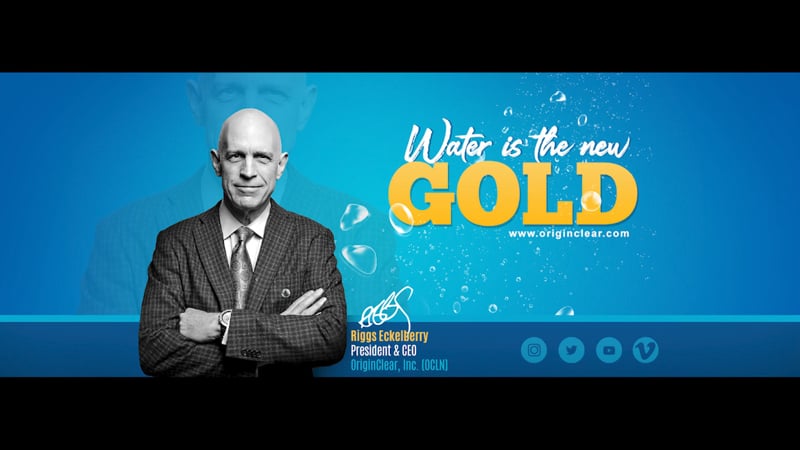
Introduction
Riggs Eckelberry:
Okay, and welcome to Water Is The New Gold. Today, I've got the amazing Chief Operating Officer of OriginClear, who's got his evening beer.
Tom: All right. Kind of the way it works down here.
Riggs: That's Florida, you know what I'm saying? But as people are joining us, yeah, literally yesterday we had, we still have boxes everywhere, but last night was our first night living in Florida. I must say, I'm a happy camper. Then of course today, you had to hit me with all this good stuff about Florida in terms of opportunity, but it's also a pretty amazing state in terms of pollution. Oh my gosh.
Tom: It depends on how you think about it. It's complex. There's wonderful things about the state of Florida being free and interesting and productive for industry. But at the same time, there's also some fairly dirty industries down here, which always present industrial solutions that have to be cleaned up.
Riggs: Which for us is opportunity. But it's just about really every zip code in America has its own set of problems.
Tom: Yeah, absolutely.
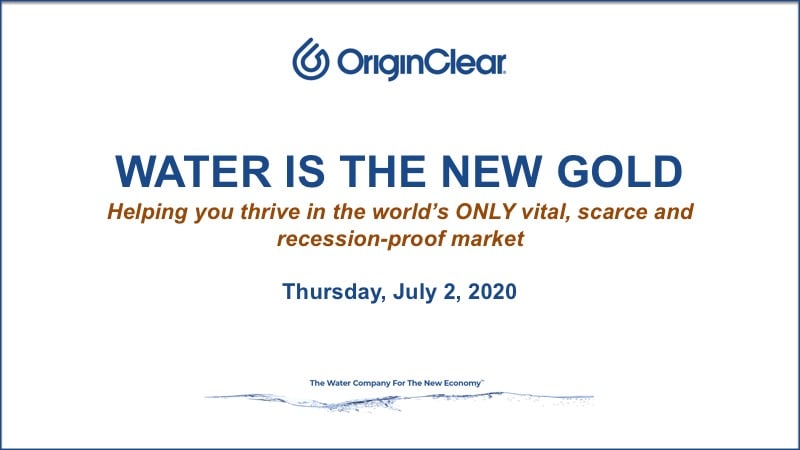
Riggs: Today is the 2nd of July, Thursday, 2020. Water Is The New Gold, “Helping you thrive in the world's ONLY vital, scarce and recession-proof market.” Now, this is more than just a slogan because we are working to make water the new alternative investment. Water has been super stable since 1858 when the parent, the original company that became Veolia was launched in France, and it's never had a crash the way real estate has had or oil and gas. It's just not a speculative environment. And we're finding now that water treatment is going to the edge as we say. Water systems are small enough that everyday investors can invest. That is the whole Investor Water™ story. But today, we are going to be covering some of the more classic OriginClear activities. Before I go on, I'm just going to give you a little disclaimer, safe harbor statement as usual.
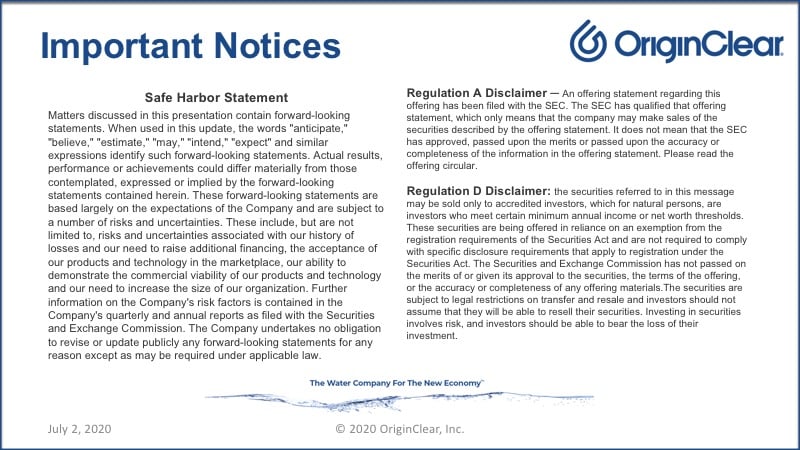
Important Notices
We do our very, very best to anticipate actual facts and to state only the facts. But of course, we're not prophets. We do our best. Regulation A, we're literally refiling the regulation A with some improvements, and you'll be hearing more about that. And then finally, the regulation D is what's going on right now, where you can invest in an offering of the company. That has very interesting features that we can discuss separately. Okay. I'm going to stop sharing, and Tom, I would like you to go ahead and take over and show us what you got.
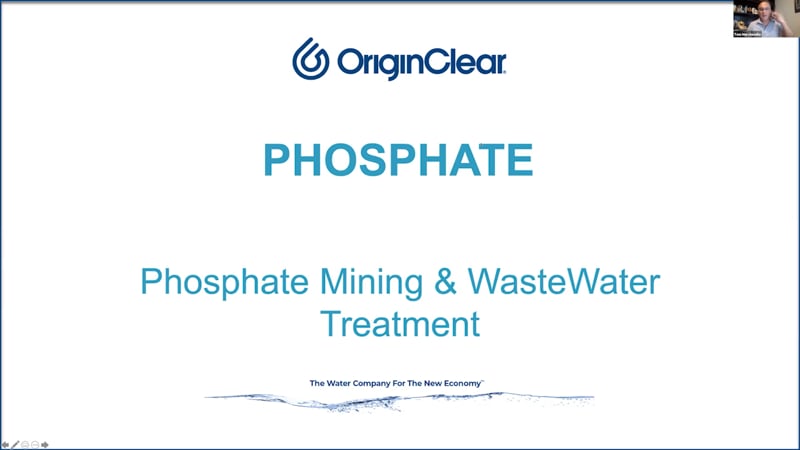
Phosphate Mining
Tom: Cool. What am I talking about today? So, I actually was informing Riggs that we were working on a project to deal with phosphate, and phosphate ends up in wastewater streams. You're like, well, how does phosphate get in water? And why is it a problem? The truth is we constantly get people calling going, "I want to take care of this problem. There's arsenic in the water. I want to take care of this problem. There's benzene in the water. I have a problem. There's phosphate in the water." We get the request and you start thinking going, well, why? Or who's this industry? Or what's really going on? And ironically in Florida, there's a big problem here that's been going on for some years around phosphate. Phosphate is a naturally occurring earth mineral that Florida just so happens to be very blessed with because there's the largest phosphate deposit in the entire United States here in Florida. And it actually is mined.
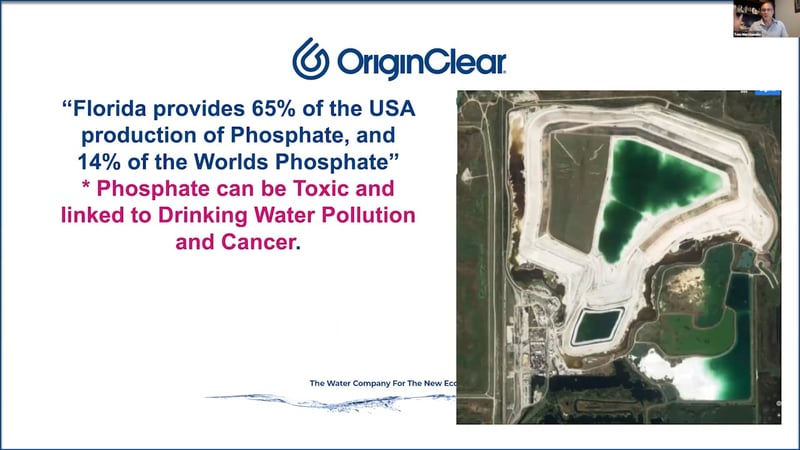
Florida Provides 65%
It's strip mined of all things, which that awful dirty word where they literally just tear up the earth and pull the dirt away and stuff. Florida supplies 65% of all of the phosphate for the entire United States and 15% of the world. It's a huge export, goes out of Tampa Bay actually. There's a big production facility there basically that boots that stuff out of here. Unfortunately, phosphate's insanely toxic and it's basically got some uranium in it, basically. It's like a weak uranium.
Riggs: Yeah. Florida has naturally occurring uranium and radon, right?
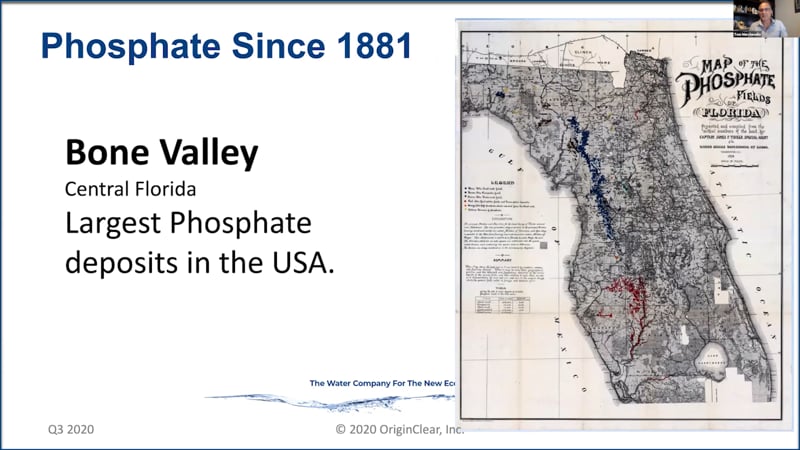
Bone Valley
Tom: Right, because of these big deposits because back in 1881, this guy's surveying all of Florida and he figures out this blue strip here, and this red strip here on this map is these deposits of phosphate. They figure it out. They send it to the Smithsonian. They determined that it's actually pretty important stuff.
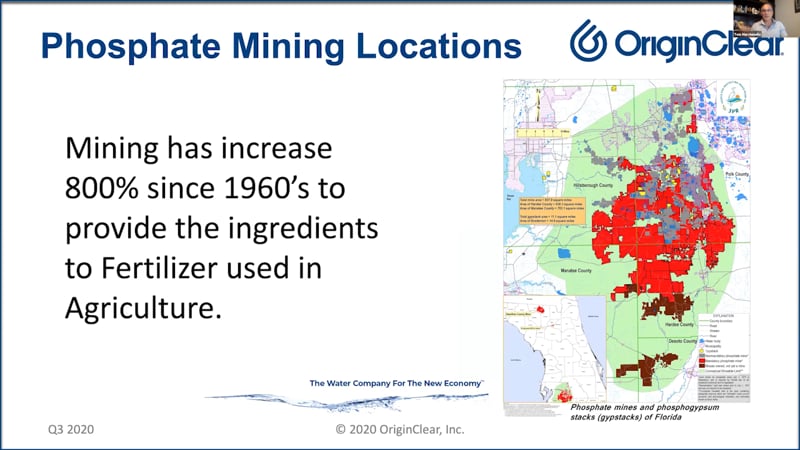
Just East Of Tampa
Back in the day, they're realizing that phosphate can be used for different industries, but the number one use of it really picks up years later because phosphate becomes one of the top ingredients to fertilizer, and fertilizer being the big thing for agriculture. And so in that way, this huge deposit that sits just East of Tampa happens to be the largest mining operation of phosphate in the entire United States. And it's massive and it's been going on for 100 years. But from 1960 until the 2000s, you had 60 strong years of it just expanding exponentially, of them mining the daylights out of this product.
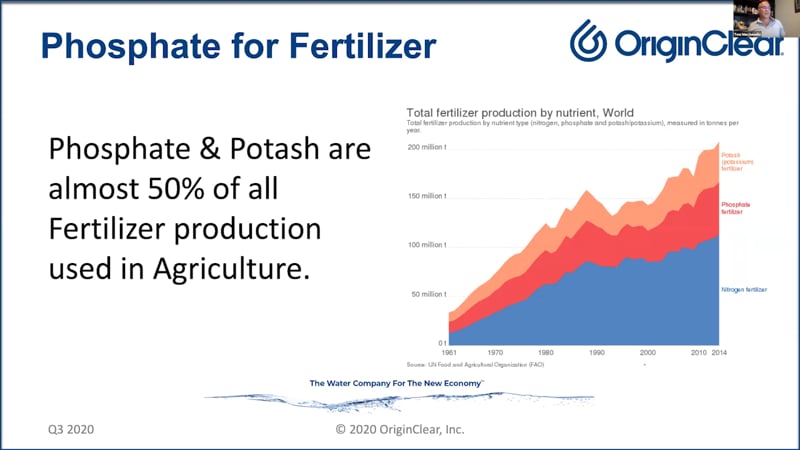
A Waste Stream Comes With It
You can see the chart here, they're really pulling a lot of phosphate out of the ground. It's all coming out of the ground right here in Florida. Well, have all your thoughts on it. If you understand what is fertilizer and what is phosphate, the bottom line is there's a problem here on what they do in order to produce phosphate. And so, when they pull all the materials out, they throw it in these settling ponds and they wash it down with water in order to do the separation and then scrape the phosphate off. And then there's a waste stream of water that comes with it as well. But instead of treating it, they just make bigger and bigger ponds that basically hold more and more of the wastewater. And then in order to try to produce more phosphate, they pour more water on it.
Collapsing Aquifers
So, what they're doing is they're sucking the aquifers dry in Florida to dilute the phosphate production. And what you're having happen is it's causing all the sinkholes in the aquifers because you're just collapsing the aquifers in the state. And then of course the other side of this as you have all this phosphate coming out and all this waste stream going out, you're pushing all this fertilizer basically down the rivers out into the Gulf of Mexico, and that's what's causing your red tide blooms.
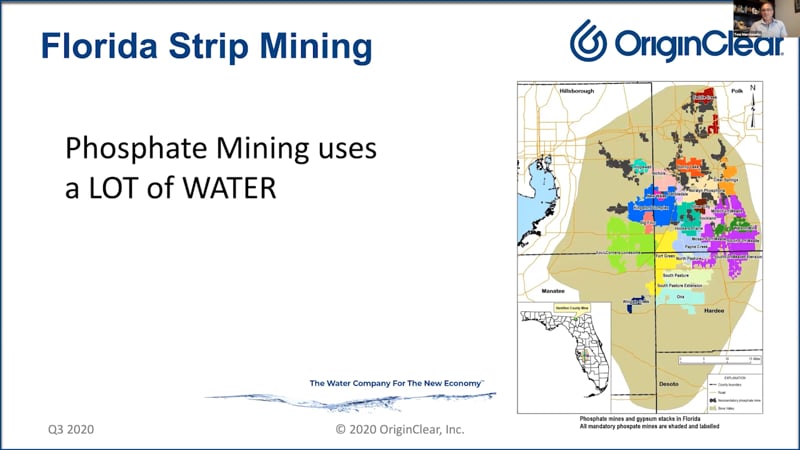
So interesting little play, you can just trace it all back to this industry.
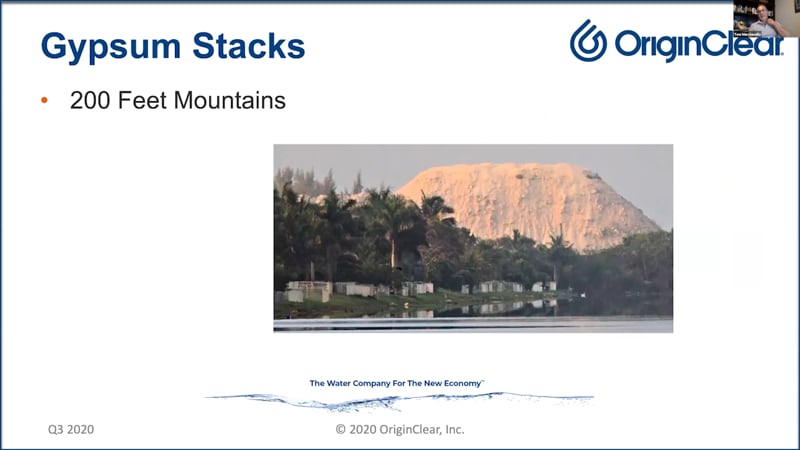
Gypsum Mountains
And it turns out what you're looking at here is a mountain in Florida. There's actually a mountain.
Riggs: Oh my God.
Tom: Yeah. 200 to 400 feet high gypsum stack. It's a real thing. So this is actually like 60 miles East of Tampa where you're living right now. There's literally mountains of soil.
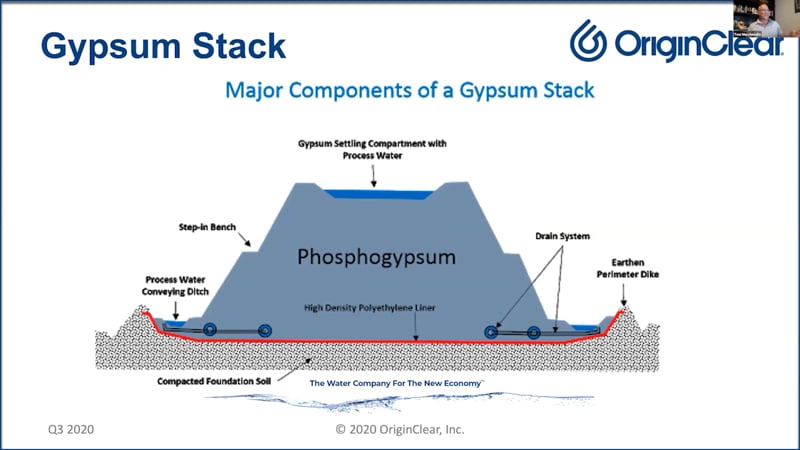
Where Our Job Comes In
What you're looking at is a phosphate gypsum stack, and so what you'll see is they literally have the material that they've mined around piled. Then they put process water at the top of it and then they basically have a whole drainage and processing water system at the bottom. So, this is where our job comes in. We actually had the technologies to service the process water at these sites to make them less toxic, which is kind of interesting. And that's where Dan and I were coming up with it.
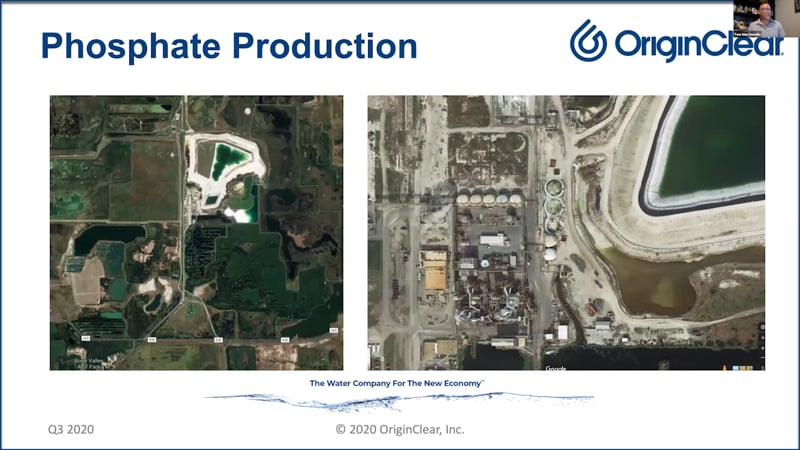
Pond On Top
And I was looking at one of the facilities of one of the plant producers, you can see it here on the right. You know, it's a typical plant, whether they're doing the extraction. The thing on the right, if you've noticed this, it looks like a pond. That's that gypsum stack that's actually 200 feet high with a pond on Top.
Riggs: Oh, my God.
Tom: It's a mountain in Florida. And then you see on the left, the actual distance from space. Right here is actually that same little processing plant.
Riggs: Oh, my God.
Tom: This little tiny thing in the corner. And this pond lagoon is actually something of five to 40 acres of these toxic ponds, full of basically toxic water.
Riggs: Oh, my God. It's crazy.
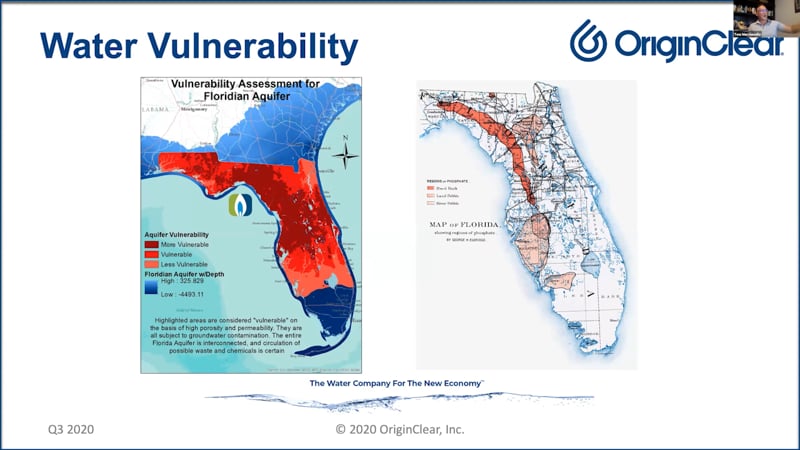
Environmental Impact
Tom: It's crazy, right? So the scale of the problem, the scale of the issue is fascinating because all you need to do is overlay the sites where the mining is taking place. The sites where the phosphate deposits are and where the aquifers are and the ones that are being impacted. And you'll see high correlations to the water table issues.
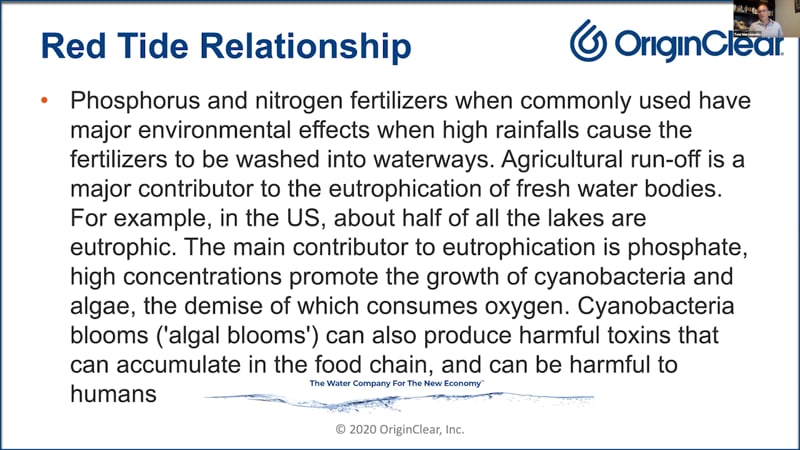
And then, you also see the problems with red tide because red tide is directly related to phosphorus and nitrogen, which ignites the algae blooms.
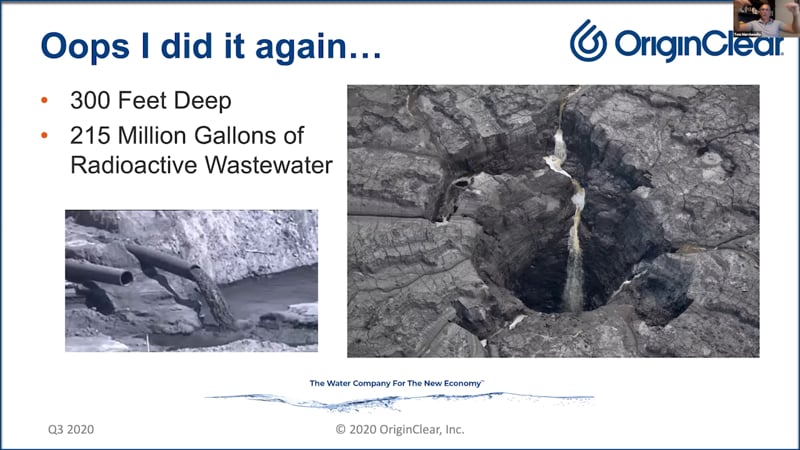
Sinkholes
And then lastly, the sinkhole issues, this is a picture of a massive sinkhole at actually one of those plants like I just showed you. Where it literally sucked up 215 million gallons of radioactive wastewater. It went 300 feet down into the ground, just all this crazy stuff.
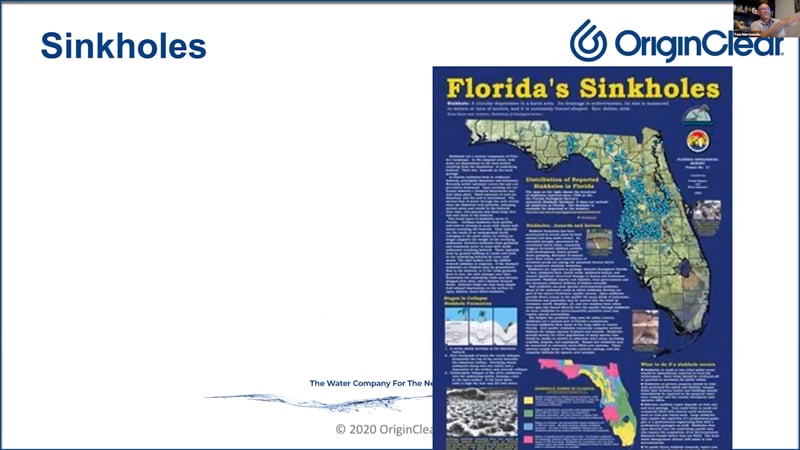
And I was like, just trying to read about it. There's all these maps of where all the sinkholes and what's going on here in Florida. And I just find it to just be one of those crazy, crazy stories about an industry that's out here in our own backyard. And we were looking at this because we kept getting these interesting email and phone calls asking, "Hey, do you have the ability to separate phosphate from water? Do you have the ability to reduce some of the waste stream?" And I'm like, "Yeah, we do. What's it for?" "Oh, I can't tell you that right now?" You know, I went around the dance for a couple months on some different guys trying to understand what industry they were coming from. But once I finally pulled it all together, I was like, "Oh my gosh, this is a massive industry." There's billions and billions of dollars at stake on this.
Not Theoretical
Riggs: So, what you're saying is this is not just a theoretical discussion. You're actually hearing from industry people who need a real-world problem solved. And it happened to be a very large particular player in the space.
Tom: Yeah. There is probably a good five or 10 players in the space, fairly large names, public companies, each over a billion dollars plus in the category. This happens to be one of those facilities that I had contacted one of their engineers. And they were looking to deal with some of these settling ponds and some of these processing ponds. And obviously, there's a lot of measures that need to go into these places but at the very least there's some mitigation we can be doing in a couple of those spots. And so, that's why we're taking a look at it.
Riggs: Fascinating. So basically, what we're talking about is an actual sales process where you're the front end of it. You've spent some time already responding to inquiries because we get these and then, trying to see where people are coming from with them. Obviously, this is part of the bigger picture for Progressive Water™ and Modular Water Systems™. Since you were assigned to focus on our revenue centers, what have you been doing? Where's the battle at? Tell us about it.
Bread & Butter
Tom: The battle, the battle is every day. No, the truth actually, everybody is super motivated. Marc and Mike and Dan and the team have been just really cranking. I'm really impressed with their get up and go. We've been putting a lot of effort into, I would say three areas. One was our products, right? We had a couple new products we were putting forward, like the booster pump skids. And we were obviously pushing our reverse osmosis and our pump stations. So, things that were bread and butter products that everybody needs right now but the way we're getting them into everybody's hands was changing a little bit. If you remember a couple of weeks when Dan was talking about it, I've been having Dan and Mike and a couple of the guys doing more presentations to consulting engineers, sales engineers and guys who are in the water industry, so that they see our products and understand how they work and are implemented.
More Marketing
And also we're doing CE Credits, which are Continuing Education Credits because we're at the same time teaching them about wastewater and drinking water treatment, they're also earning their credits for their engineering. And they're learning about our products, that's a win-win for us, right? And that process has led to a lot of new leads, which drove in a bunch of new proposal work. So, the guys have been super busy knocking out proposals on our core products, right? Which is wonderful. Then the other side of it was just more marketing. So then, it was more about just telling everybody what we do. The guys are very proud of the work they do and they're very capable. And so, sometimes we forget, we get caught up just grinding it out.
Coronavirus Didn’t Get Us
And lately I've been trying to make them take some extra pictures of the machines, write down the story, what it is and then send out an email. Send it out to your top 10 favorite folks and send it out to the 50 guys who bought from you in the last five years. And send it out to the hundred guys who never bought from you but they liked us. But maybe they didn't buy from us and just let them know what we're doing. And we're here, we're alive. Coronavirus didn't get us. Everybody's actually healthy in our shop. Not a single person got sick this whole time, thank God, and let them know that we're working. So, that's been working great. People responded really positively to that. So, simple stuff.
Riggs: Yeah. I mean, you can say really that we're doing what as a corporate parent we should be doing, which is the whole CRM, building the Salesforce type operation and so forth. Which enables the guys to move beyond the good old boy network and really run a whole nurture, right?
And The Supply Chain?
Tom: Yeah. But we're doing it the good old Texas way, which is very personal, which is all right. No, it's true but it matters. Because remember, this is an industry that's been around a long time, so guys know one another. They're pretty close so sometimes you just got to let folks know you're out there and you're doing good work. And I think people appreciate that. Plus, let's face facts, coronavirus kind of jolted everybody to the point where people were just a little froze and they weren't sure, are they working or what's going on with the supply chain. So, we're just reminding them that it's like, "Hey, everybody's got work to do, let's get to it."
New Innovations & Basics
So, it's been helping. And then on the last front, it's really been innovation, working side by side with, Marc and Dan and the guys. We're looking at the areas where we have success and capabilities still. So, there's a few little areas where sometimes we make an entire machine and other times we make an assembly or a component, which is maybe just a critical part. And some of those critical parts are really a key to growth in our industry. It could be as simple as putting together a much more efficient tank system for water storage. The tankage itself is an interesting innovation, the way we do it. Not just the entire machine with all the pumps and stuff attached to the tank. So, sometimes when we put those simple parts together, that's something else that we can let people know about. And we've actually been receiving orders just for some bread and butter basics.
Riggs: Well, when you looked at it, you did a whole analysis and you found that the bread and butter is actually pretty important for us.
Tom: Absolutely. Yeah. Bread and butter will do a couple of things. It's like a lead in. There's a less expensive way to sell a $50,000 part than a $200,000 machine. And so sometimes that'll get people to do business, and then they can order up, basically. They sell themselves up to the next product level and that's a good way to keep people going.
Repair & Replacement
There's also a lot of need for what I would call repair and replacement right now. As you've talked about it so many times about the aging infrastructure, it's a disaster in some cities between their pipe systems and their old junk that's buried in the ground, old water tanks, old oil tanks. These things are made out of concrete or steel or whatever, and it corrodes and dies after 20, 30, 40 years in the ground. The truth of the matter is that's all repair and replace work, and we're thrilled to go in there and get some repair and replace work, because that's core work that everybody actually fundamentally needs.
The Crossover
Riggs: Well, and then, here's what's interesting though, because obviously you're still dealing with a relatively slow growth operation. What you're doing is super important, but then there's the crossover with what we're doing here with Investor Water, where you're now bidding on jobs that actually have funding, have investors. How is that changing the way the operation is going to work, in your opinion?
Tom: Well, I think it's interesting. It creates a different dynamic and a faster pace. I think the investor part of it lets us accelerate quicker beyond our natural process, because the water industry has some slowness to it in the way the sales cycle works and the equipment cycle works. But on the Investor Water side, you can identify gaps and then match money to fill an opportunity and also generate profit for everybody in the process. So that's kind of cool. I think it gives an opportunity for everybody to play.
The “Pondster”
Riggs: This going to be a very popular with the water companies, right? So, where we stand right now as you and I have been going back and forth, is we have the trailer park pilot project, and next week we'll cover in greater detail the pond monster, so-called pondster, which you guys are developing.
Tom: The pondsta.
Riggs: The pondsta. The pondsta. Which is a fantastic solution. But the amazing part is of course that we have an investor who will work directly with the end-user in the field and then is basically, she's chomping at the bit, isn't she? Oh my gosh. She's reminding me. I'm in the middle of my move and she's like, "Where's my deal?" I'm like, "Yeah, okay."
The Product Really Works
Tom: Well, I actually finished that call today with the customer and our engineer today, because we had a few things to do on the environmental side. I'm really proud of that product too, because it's really strong. I mean, it's a strong offering from us, but it's actually, the machine itself is really strong. I know for a fact, if you're going into like some of these outdoor pond scenarios for trailer parks or commercial clients, and we put this in place for them, it really, really will work to reduce the issues at that location. And that's why I like it so much, because it has a real effective change for whoever's using it.
A Viable, Legal Way Forward
Riggs: Good. Well, that is exactly how it's intended. I'm glad you worked with the owner of the property. And we've got the investor chomping at the bit. And of course, as we know, we cannot yet operate the marketplace per se with taking a percentage for ourselves because that would be an investment offering. But the good news is that we believe that we have a viable, legal way forward with a potential partner who has worked it out, who has managed to figure out a way to bypass the real estate mortgage industry by having investors invest directly in properties. Essentially these are rehabs. It's a whole thing of its own. They're on the Inc.500. They've worked on how to do these direct offerings. So, we believe that we're going to be able to adopt that. So more on that shortly.
Tom: We'll be talking more about this phosphate topic, I think, as we go forward, because there's so much to unpack there between that and the connection to red tide and aquifer levels. But the bottom line, the way I saw it, was we all care about drinking water, right? We care about clean drinking, safe water. And this is one of those big stories where it's like, "Oh my God, this hits every aspect of all the stuff you've been talking about for 10 years." And it's kind of cool. It's actually something we can play with in our own backyard.
Riggs: I can't wait. Again, we're going to make a big difference in the Florida peninsula if we can address this. Good luck continuing to work with these people, these unnamed people that you can't discuss.
Tom: They're out there. You can look them up.
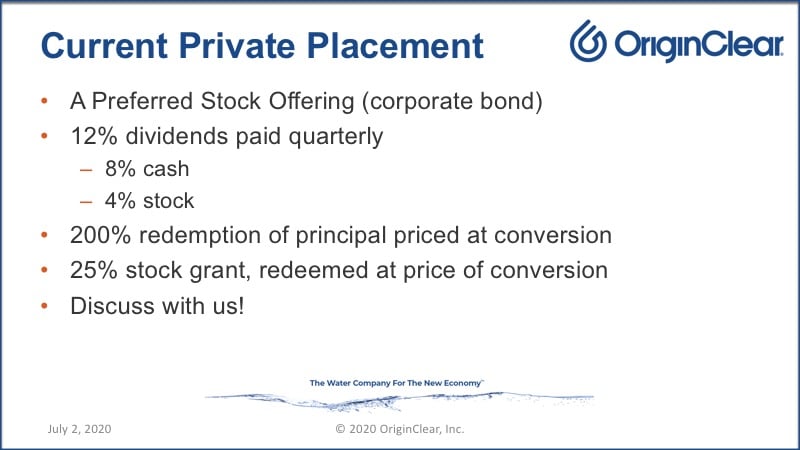
Current Private Placement
Riggs: Right on, right on. Well, thank you Tom. And I'm going to go ahead and share screen now. So right now you cannot invest directly in water equipment. We hope to have that resolved soon. What you can invest in is our private placement, which is an alternative investment too. Why? An alternative investment is one that is not affected by current stock price. The stock price goes up, the stock price goes down, big deal. Typically, an alternative investment offers yield, right? And it also offers liquidity and a measure of safety. So, what is this? What we're doing is we put together a corporate bond, and this is for accredited investors only or foreign investors. So if you are non-US citizen and invest and you're outside the US at the time you invest, you don't have to prove you're accredited. But if you're in the US then you need to do that. You need to show that you're accredited investor, and we're happy to discuss that with you.
Preferred, Not Common Stock
What this is is preferred stock, which means it's not issued as common stock. During the time that you own it, we pay you 12% dividends per year, paid quarterly, 8% in cash, 4% in stock. I think we've done this now for 30 months. Yeah, 30 months. So, we're very good at paying dividends. And here's the cool part. Whatever amount you invest, 100,000, 25,000, whatever it is, you can then redeem the entirety, basically repay yourself that principal, double in stock. So let's say you invest the $25,000. Well, let's call it $50,000 because I'm going to get to the other part. Call it $50,000 just for argument's sake.
When You Might Convert
You then get to convert that to not just $50,000, to $100,000 dollars in stock. And it's priced at the price at that time later. Now, upside is if the stock went down in the interim, you are protected. Downside is if you wait too long and the stock starts to run, then you lose the bottom. So, at some point you have to pull the trigger and convert to common, but at least you're not…Basically, stock goes down, you don't worry. Stock goes up, you need to start thinking about making that conversion.
Finally, we give you 25% of your investment in stock. In that same example, $12,500 goes to you as a straight-out stock grant, and you will redeem it and it's priced at the time you convert it into common stock. Again, you're protected from stock price going down, relatively speaking. Remember, there's always risk. But when you convert, you are converting at the price at that time. And again, you want to be aware of the stock doing good things, because we've been doing a good job and you kind of want to convert, but you are protected from the downside.
Discuss It With Us
We want you to discuss that with us. Now, who are the very best people in the world to discuss that with? Well, I was waiting for you to ask me that very, very same question. It is the wizard of business development, Ken Berenger. He is at extension 201. We're about to update these phone numbers, but they work just fine because we're moving the administration to Clearwater. We'll get into that next week more specifically. Ken Berenger extension 201. Devin Angus is my assistant and he works with all of the shareholders. He's at extension 116. If you want to talk to me, he's the best guy to contact.
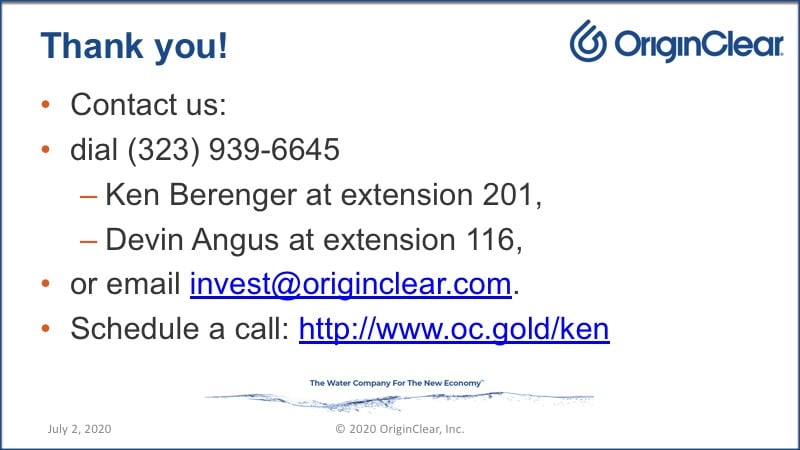
You can always email invest@originclear.com. Here's what's cool. If you just type into your browser, oc.gold/ken, you don't have to type in all the https and stuff. Just type in oc.gold/ken and it schedules a call with Ken. We'd love to have you talk to him. And by the way, somebody alerted us that when we send texts, if you are receiving a text at a landline, then that's not appropriate and we will make sure that's fixed. So always let us know. We want to be extremely compliant with our group texts. Do let us know at any time, just email invest@originclear.com and Devin will be happy to take care of any issues you have with how we are promoting to you, whether we're being relevant, whether we're hitting you too hard, all that stuff. We really, really care about that.
Recap
Okay. Well, it's been incredible having you guys here. So, to recap, Tom is in there just upgrading all the activities in Texas. Great team, but they were operating very much on the basis of just good works that speak for themselves and what you want is good works that are publicized. So that's what we have here is, is he's really getting in there making all the promotional activities work, but we still have the basic, basic problem the entire water industry has, which is that we have these lengthy funding cycles. Now that Modular Water Systems is part of our company, we're able to offer roll-in roll-out systems in a very, very flexible, short term lease or rental program to regular water users.
Now working with municipalities and corporations, we do that the old-fashioned way, but when we were talking to individual companies that are doing their own water work, like breweries or industrial users or animal farms and so forth. They need a system and they often need it right away, but then they have this whole capital cycle. We can make it happen. How? Because we're developing this marketplace of uniting regular ordinary investors like you and me with water projects. I'm super excited about that.
Where We Stand
Where does that stand right now? We're literally about to pull the trigger on pilot project number two, which is that trailer park remediation. We have the product, which is we've called the pondster, the pond monster. It is going to be, again, this is super cool because we roll these things out with funding and then Texas takes it over as a regular product line to continue it with or without the innovative self-funding. So again, we have the investor, we have the end user. Tom has been working on the contracts with the end user, making sure they're all happy and it appears that they are. Meanwhile, the financier, the investor has been bugging me like crazy during my move. We're going to bring them together, get the deal done, and then let you know as soon as we have it done. So that's pilot number two.
Pilot number three is also in progress. We have an investor, we have a site that wants, a hog farm, that wants this pretreat, again pondster, but we're much, much bigger. That is happening as well. I feel quite sure that well before labor day we'll have those two additional ones done. Then I'll be able to pull the trigger and take us into a market mode with the same time in parallel, the full legal due diligence. So we'll have a legal structure. I believe I'll be able to tell you about the legal structure next week. Please tune in. These are very, very exciting times. It is the Airbnb for water, and we really appreciate your support as we move into the real world away and out of the lab. Thanks all. Have a great July. Enjoy July 4th and be safe, but remember to have fun. Thank you all and good night.
Register for next week’s Insider Briefing: HERE
%20250px.png?width=250&height=53&name=OriginClear%20Logo%202019%20(RGB)%20250px.png)



